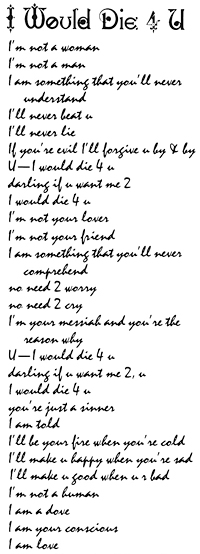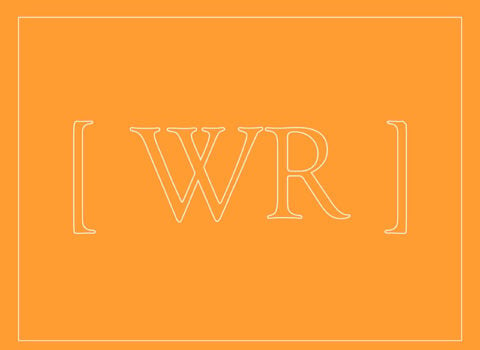We were pleased recently to find, in the course of our usually disconsolate midnight googlings, a discussion in the fan forums at Prince.org of Hilton Als’s memoir “I Am Your Conscious, I Am Love: A paean 2 Prince,” which appears in the current issue of the magazine.
Though the contributors to the thread seem mostly to support the idea of reading Als’s piece, a conclusion we applaud, there is one small point on which we would like to weigh in. A user calling herself Genesia writes:
Lord…get the lyrics right. It’s
I’m your conscience…I am love.
Later, she adds:
[I]f it’s a paean to Prince (as claimed), you’d have to think it was a quotation of the lyrics. I think [Als] just got it wrong.
Genesia, author of some 21,774 Prince.org posts, is partially correct. The Artist’s manuscript draft of “I Would Die 4 U,” the source song of the lyric in question, quite clearly renders the line as “I’m your conscience, I am love.” But at some point between Prince’s composition of the song and its appearance on Purple Rain, the lyric changed. The album’s liner notes — along with the perhaps slightly less authoritative adaptation for piano, voice, and guitar published by Hal Leonard — give the version Als quotes in his title, “I am your conscious, I am love.” Prince’s articulation of the line in the recording of “I Would Die 4 U,” far from resolving the Als–Genesia debate, begets only further confusion:
It was decided in the final days of the December production cycle — after many hours spent discussing the Princely syllabication of the phrase “not cha body” and the degrees of skew necessary to make the pictographic title of the Love Symbol Album appear italicized (answer: 11) — that the idiosyncratic and uncontracted version of the lyric resonated best with Als’s essay, and that the liner notes could reasonably be treated as definitive. Perhaps ![]() can tell us whether we were mistaken — though there must, we imagine, be a private joy in allowing the question to linger.
can tell us whether we were mistaken — though there must, we imagine, be a private joy in allowing the question to linger.




